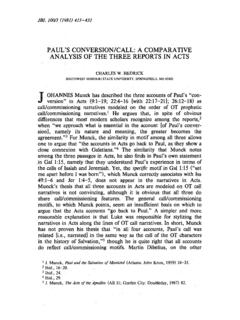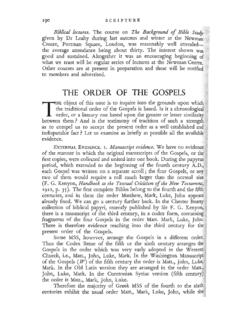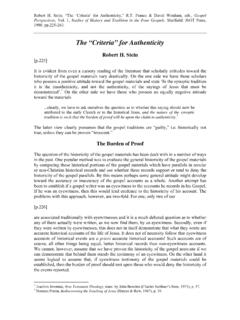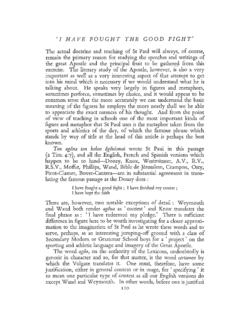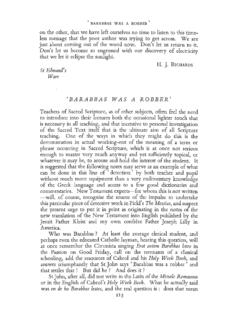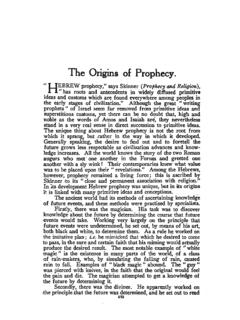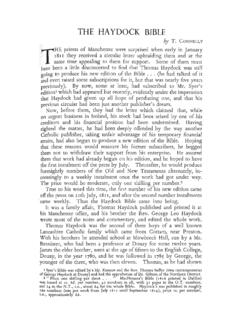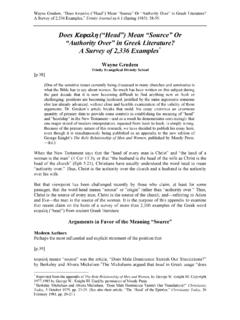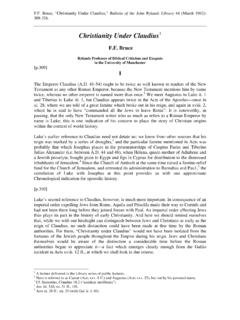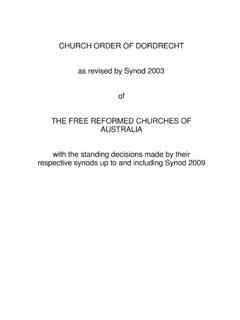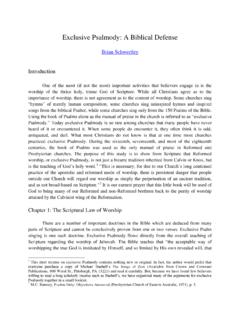Transcription of Theology of Preaching in Martin Luther
1 Dennis Ngien, Theology of Preaching in Martin Luther , Themelios (Spring 2003): 28-48. Theology of Preaching in Martin Luther Dennis Ngien [ ] Dennis Ngien is a Faculty member in Systematic Theology at Tyndale Seminary, Toronto, Canada. He is also the Founder of Centre of Mentorship and Theological Reflection, mentoring pastors and church leaders, particularly in biblical and theological contents. In this article he offers an exposition of Luther s Theology of Preaching . Introduction James Mackinnon, a Luther scholar, observed that there is no exhaustive treatise, even in German, on Luther s Preaching .1 Theology and Preaching , for Luther , are indissolubly one.
2 In his Large Catechism, 1530, Luther declared: I am both a doctor and a preacher2 Luther elevated Preaching as an indispensable means of grace, seeing it as central to the church liturgy. To hear mass means nothing else but to hear God s Word and thereby serve God. 3 In his On the Councils and the Church (1539), Luther asserted that the Preaching office constitutes the sure sign of a true church: Now, wherever you hear or see this word preached, believed, professed, and lived, do not doubt that the true Catholic church: a Christian holy people must be there, even though their number is It is supremely through the words of the preacher that the Word of God in the Scriptures is made alive in the present.
3 Luther says that one must see the word of the preacher as God s Word .5 He elaborated on this in his Operationes in Psalmos: The apostles wrote very little, but they spoke a Notice: it says let their voices be heard, not let their books be read. The ministry of the New Testament is not engraved on dead tablets of stone; rather it sounds in a living Through [ ] a living Word God accomplishes and fulfils his Following the same vein of thought, in his Church Postil of 1522, Luther insisted on calling the church a mouth house , not a pen house . For since the advent of Christ, the gospel, which used to be hidden in the Scriptures, has become an oral Preaching .
4 And thus it is the manner of the NT and of the gospel that it must be preached and performed by word of mouth and a living voice. Christ himself has not 1 MacKinnon, James, Luther and the Reformation, 4 vols, (London: Longmans, Green & Co., 1930), 4:318, n. 66. 2 WA 30, 1, 126. The primary source for this study is the critical edition of Luther s works, the Weimar Ausgabe, abbreviated as WA, most of which have been translated into English, abbreviated as LW. 3 LW 51, 262, WA 36, 354. 4 LW 41,150. 5 LW 22, 526, WA 47, 227. 6 WA 5, 537 as quoted in A. Skevington Wood, Captive to the Word.
5 Martin Luther . Doctor of Sacred Scripture (Grand Rapids, Michigan: Eerdmans Publishing Co., 1969), 90. Dennis Ngien, Theology of Preaching in Martin Luther , Themelios (Spring 2003): 28-48. written anything, nor has he ordered anything to be written, but rather to be preached by word of Pelikan wrote accurately of Luther : The Word of God was the speech of God, and the God who speaks would be an appropriate way to summarise Luther s picture of God .8 The Word of God spoken is itself the Word of God in Preaching or God s own speech to us. Thus Preaching has a dual aspect: divine activity and human activity, God s Word and human speech.
6 This article will focus on four aspects to elucidate Luther s Theology of Preaching : (I) How his doctrine of the Word of God governs his Preaching ; (II) How law and gospel are both the functions of the one and same Word, are to be preached; (III) Preaching Christ as sacrament and example, the appropriateness of which will be delineated; (IV) How the Word and the Spirit work together in unity, fulfilling the efficacy of Preaching . The Word of God in Preaching While medieval Theology developed the doctrine of sacraments, Luther was the first to construct a doctrine of the Word of This doctrine permeates all of his lectures, commentaries, treatises and sermons.
7 The reformer, being held captive by and to the Word of God, preached extensively and his sermons number over two thousand. In Luther s Table Talk he expounded on the various constituents of the term Word : [ ] Somebody asked, Doctor, is the Word that Christ spoke when he was on earth the same in fact and in effect as the Word preached by a minister? The doctor replied, Yes, because he said, He who hears you hears me (Luke 10:16). And Paul calls the Word the power of God (Rom. 1:16) . Then the inquirer asked, Doctor, isn t there a difference between the Word that became flesh (John 1:14) and the Word that is proclaimed by Christ or by a minister?
8 By all means! he replied. The former is the incarnate Word, who was true God from the beginning, and the latter is the Word that s proclaimed. The former Word is in substance God; the latter Word is in its effect the power of God, but isn t God in substance, for it has a man s nature, whether it s spoken by Christ or by a minister .10 7 WA 10, I, 48 as quoted in Timothy George, Theology of the Reformers (Nashville: Broadman Press, 1988), 91. 8 Jaroslav Pelikan, Luther the Expositor: Introduction to the Reformer s Exegetical Writings Luther s Works, Companion Volume (St.)
9 Louis: Concordia Publishing House, 1959), 50. 9 Reinhold Seeberg, Text-book of the History of Doctrines, trans. Charles E. Hay, 2 vols. (Grand Rapids: Baker Book House, 1952), 2:282. 10 LW 54, 394, no. 5177; WA 4:695-96. Dennis Ngien, Theology of Preaching in Martin Luther , Themelios (Spring 2003): 28-48. God continues to speak to people through the preached Word. It is through this Word that he is present with his people and continues to meet people salvifically. God assumes human form in order to speak with them as man speaks with man ,11 Preaching must thereby observe the limit which God has prescribed: We have to argue in one way about God or the will of God as preached, revealed, offered, and worshipped, and in another way about God as he is not preached, not revealed, not offered, not worshipped.
10 To the extent therefore, that God hides himself and wills to be unknown to us, it is no business of ours. For here the saying truly applies, Things above us are no business of ours .12 Luther , in his The Bondage of the Will, criticised Erasmus for failing to see the distinction between the God preached and God hidden, between the Word of God and God himself. God must be left to himself in his own majesty, for in this regard we have nothing to do with him, nor has he willed that we should have anything to do with him. But we have something to do with him insofar as he is clothed and set forth in [ ] his Word, through which he offers himself to us and which is the beauty and glory with which the psalmist celebrates him as being Any speculations apart from the Word of God for Luther , is a Theology of glory.
